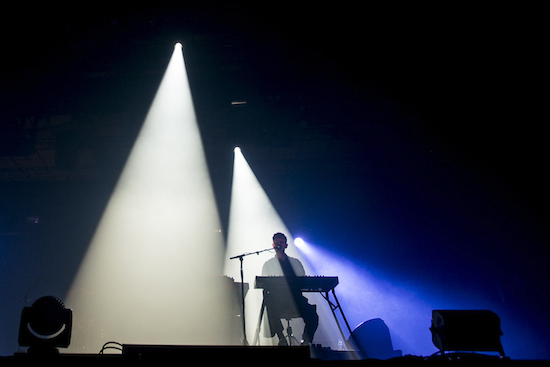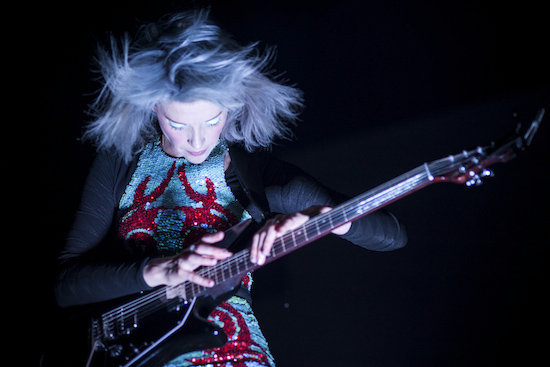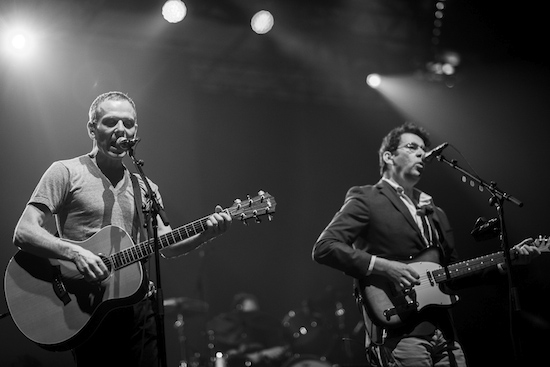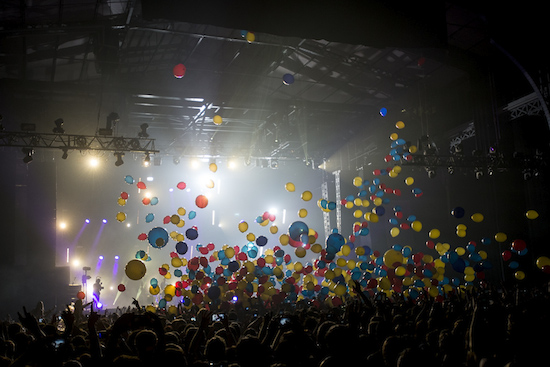We are spoiled rotten
There’s no longer any such thing as a one-size-fits-all festival and no matter what your sonic predilections it’s likely you can find a large-scale communal event that will appear eerily tailored to your desires. Pitchfork’s MO is to present a slick-as-heck triad of epic nights where every detail is curated – from the bands to the sustainable branding – against a schedule that runs like clockwork. The Grande Halle de la Villette, nestled in the top right of the 19th and abutting a pretty far-out looking Science Museum, is an architectural marvel and spectacular venue for a festival. Once inside, you don’t really want to leave. Okay, perhaps you might want to speed reasonably quickly past the Smart Car disco, wherein a neat motor covered in mirror tiles pumps out ‘Coffee & TV’ on a loop, but after that the atmosphere is channelled mainly into creating a lofty and dramatic space for live music.
Shuttlecocking between two stages at either end of the former abattoir, the live shows are fat in scale and awash with primetime-ITV lighting. You barely have to wait more than four minutes for a band to start, and if you want to take a break from the music you can play vintage computer games, scoff ‘designer’ fish and chips or browse the market of handmade goods. tQ’s Karl Smith missed the beginning of Jon Hopkins’ Field Day set queueing for churros, whereas I – in the name of experience – only heard his Thursday-night headliner in Paris at a distance because I was getting my nails done in the market. The girl in charge promised to "make a fantasy" on my fingertips. How could I refuse?
Whether you want to jostle to the front in order to eyeball Jamie XX or hang towards the back enjoying Movement with a couple of champagnes, Pitchfork Paris can make that happen for you. In fact, the only time the hall felt properly rowdy and rammed was for new masters of ident-wave, Jungle, who incite one of the more energetic raves of the weekend. Otherwise, it’s possible to roam pretty freely among the sweet and sanguine crowd, composed of many English people looking for a festival to fill a Jabberwocky-shaped hole.
Time flies when the indie is good
With the quiet, suspenseful chords and louche vocal that begins the first song of the festival’s opening band – Montreal four-piece Ought – I thought, Here we go: this is going to be totally cool and totally boring. Thankfully, I was wrong. Vocalist Tim Beeler’s narcotic drawl suddenly gathers pace and becomes the ecstatic rumble of ‘More Than Any Other Day’, a rollicking tumble of supple bass and shiny guitars, guided by Beeler’s sing/speak poetry. He’s a compelling figure, all shoulders, hips and hair, delivering lyrics like they’re falling spontaneously out of his head, punctuating melodies with breaths, doodles and tics and yelling catchy salvos that make their five-or-six-minute songs feel punchy and rapid-fire. As he flits about the stage, the band swirling at his ankles, it’s a little like watching the shrivelled cocoon of Mark E Smith split down the middle, only for a shimmering and damp new specimen to emerge. They’re so good that their set seems to be over in a flash and, in terms of being so blindsided by something new that it sticks in your brain for days to come, nothing else at the festival quite touches them.

Everyone wants to do it with James Blake
I’ve long suspected this to be the case, but here it is, publically confirmed. The air of reverence and palpable lust that hums around Blake’s presence at the close of Thursday night is quite extraordinary and it’s not difficult to see why. Blake is quietly restrained, drawing people in rather than projecting out, and it’s with the mastery of a much older, more seasoned artist that he absorbs the brimming energy from the crowd and blows it back out through slow, rousing melodies. At a festival dominated by laptop musicians (see below), Blake stands out by managing to dig something oddly human from the machines he corrals.
While it’s Blake’s voice that people want to hear, he teases and holds out, opening with ‘Air & Lack Thereof’, followed closely by ‘CMYK’, both of which rumble and crack with deep, splintered vocal fragments that blueprint the tonal trips and tricks of his own distinctive voice. It’s an extraordinary object and when he finally pipes up on ‘Limit To Your Love’, people lose it, buffeted back by thrumming base but determined to croon their affections and somehow connect. Like it or not, this is the sound of sex in 2014.

I vant to suck your blood
John Maus once said that he felt it was the responsibility of the performer to "appear", to make it viscerally clear that what is before you on the stage is a living, breathing, feeling human being. But to find an instance in which that actually happens? That is a rare thing.
By day three of this festival I’ve pretty much had enough of dudes standing behind laptops, synth/drum/vocal set-ups and songs without words. I’ve had it with electro too, and the stuff that sounds a lot like pop music or R&B but with fewer choruses and no costume changes, ie without the abandon and bombast of actual pop music.
Even the promise of St Vincent – arguably a genius, a vision, a loon and a shredding virtuoso – who performs with an icy precision, executing her mad cuckoo-clock choreography with robotic exactitude and keeping her distance from the masses. And Glasgow’s Chvrches, who, to be fair, are lapped up by an impressive crowd, exist safely behind a wall of electric crunch and metallic vocal with no margin for delicious error.
It’s a relief, then, when the much-anticipated Future Islands step out in full Halloween garb, punning, goofing and declaring, "Hey man, we just wanna have a fucking good time." Despite the internet’s best efforts to reduce Samuel T Herring to a human .gif, he’s having none of it, and watching him engage in full, supine body ripples while dribbling fake blood is something everyone should do at least once in their life. Seeing this band explode out of the niche they’ve occupied for nearly ten years is thrilling, not least because there’s something utterly accessible about what they do. This is pop music, but it’s also fucking weird, in the best possible way: from bassist William Cashion, who remains straightfaced throughout despite being dressed as a witch, to Herring’s chest-beating and gyrations, looking at times like he’d rip his own head off and throw it at you in a bid to make sure you’re having as much fun as he is.
Love never dies
Belle And Sebastian feel like a slightly odd, nostalgic addendum to this festival line-up – do they belong in such a high-spec universe, so professionally void of whimsy? Actually I don’t care, because I’ve loved them since I was 14 and I’m delighted they’re here. As with most things you obsess over as a teen, there’s a tendency to think you’re the only person in the world listening, so there’s an inherent thrill (and surprise) each time a thronging crowd yobbishly sings the refrain of ‘Judy And The Dream Of Horses’. It’s the little things.
And it’s exciting too that the imminent release of their ninth album is being treated like a big deal, honoured with a festival headline set – even if they do fare better when they have more time to explore the far, sepia-tinted corners of their oeuvre. Despite seeming a little weary, not to mention being backed by the most ennui-laden string section in Paris, there’s not much they can do to disappoint – swinging from the Velvet hum of ‘You’re Just A Baby’ to the cleaner edges and subtle build of ‘I Didn’t See it Coming’. Stuart Murdoch, who flatly refuses to grown old, bops like a Bowlie and warmly recounts an afternoon win at pétanque by the nearby Canal St Martin – is this an anecdote or a lyric? Who can say.
Their new songs ‘The Party Line’ and ‘Perfect Couples’ are insistent floor-fillers, accompanied by stylised mini movies projected onto the screen behind them. The band can afford to think more cinematically now, while always retaining the option to scale back to their beginnings; it’s when this happens, midway through the set on ‘Fox in the Snow’, that Belle And Sebastian are at their best. Nothing but a tremulous voice meant for solitary ears, a piano, a picked guitar and the odd violin. Unconditional love of a band is a rare and special thing – it only happens once a lifetime – make the most of it.

There’s maybe such a thing as too perfect
There are plenty of great moments. How To Dress Well’s Tom Krell having the time of his life and radiating warmth and emotion through songs that exist somewhere between the ghosts of Green Gartside and Justin Timberlake; Movement beaming rich, audacious vocals and complex squalling melodies; Scandinavian popstrel MØ chucking everything she has at the wall, bouncing around the stage in the manner of Melanie C and ending her set in the middle of an ecstatic crowd. Or tUnE-yArDs twisting single snare hits into elaborate knots and belting playground anthems that hit you square in the solar plexus; Tobias Jesso Jr making his live debut, alone with a piano and echoing bittersweetness around the lofty hall. Or the moment when Stuart Murdoch walked passed and my legs stopped working.
So it’s odd that I don’t come away feeling as ecstatic as I expected – would I have had more fun if I was off my face? Probably yes, but that’s cheating. It’s a criticism that’s been levelled at the festival before, but I’d concur that seamless perfection, attention to detail and a certain hip self-consciousness conspire to create the kind of environment where the unexpected, anarchic or revolutionary are unlikely to happen. It’s impossible to deny Pitchfork’s influence, but the price is a certain, quixotic spirit that makes other, scraggier festivals such a treat.
<div class="fb-comments" data-href="http://thequietus.com/articles/16705-positive-centre-in-silent-series-review” data-width="550">


